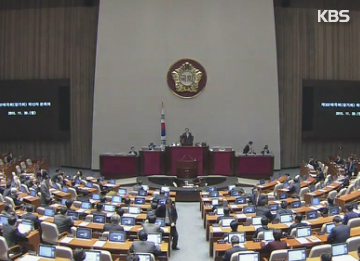The South Korean parliament on Monday approved the nation’s free trade agreement with China. The parliamentary ratification came about six months after the leaders of the two countries signed the deal and made it possible for the pact to take effect within the year. The trade pact was passed at a plenary session with 196 voting for, 33 against and 36 abstaining. The floor leaders of rival parties agreed to ratify the deal early Monday after talks that lasted overnight. The government intends to complete all administrative procedures within 20 days, so that the pact can go into effect within this year. The government says the agreement should go into effect this year for South Korean firms to benefit from two tariff reductions worth around one-point-five trillion won. Year-one tariffs will go down on the day the FTA goes into effect, while year-two tariffs will be lowered on January 1.
The two countries struck the agreement in November, 30 months after the two sides started trade negotiations in May 2012. They initialed the deal in February and officially signed it in June. Under the deal, China will abolish tariffs on 91 percent of import items from South Korea within 20 years. South Korea will also lift tariffs on 92 percent of Chinese import items within the same period, but Chinese agricultural products have been excluded. The two sides agreed to exclude rice, which is a sensitive issue for South Korea. Six-hundred-and-ten items, including hot pepper, garlic, onion, beef, pork, apples and pears, will also be excluded from the list of items that will see a tariff reduction. The South Korean government expects that the South Korea-China FTA will benefit the country overall, although some local industries will take loss from it. South Korean makers of apparel, cosmetics, household appliances and gourmet foods, which are highly popular in China, are expected to enjoy the benefits of the FTA. However, the local agro-fishery industry is estimated to lose 870 billion won for 20 years as a result of the ratification of the FTA with China, as well as the FTAs with Vietnam and New Zealand.


